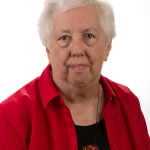Listen to God
Throughout our lives we have been told to “Listen.” Perhaps it was our mother, teacher, spouse, friend, or even the public media trying to sell us something. In every case we were/are told to listen to the message addressed to us. The scriptures also tell us to listen: “This is my Son, my Chosen; listen to him” (Luke 9:35b); “Let anyone with ears to hear, listen!” (Mark 4:23); “to draw near to listen [to God] is better than the sacrifice offered by fools” (Ecclesiastes 5:1b).
Prayer and meditation are primary ways of listening to God with our mind and our heart. To really listen during times of meditation we must stop talking, slow down and allow sufficient time for our hearts to become attuned to God. This won’t happen immediately, but as we center our thoughts on God, God’s presence will be felt within.
We can also listen to God through nature. The sounds we hear may be ones of joy as the birds greet the new day; of hunger as the baby kitten cries for milk; of violence as a storm rages through the night; or of fear as an injured animal is left behind. The laughter and groaning of nature is God calling us to care for creation. We are to protect and maintain this special gift from God. Are we listening with our hearts and our minds? Does our hearing call us to action?
Georgia Harkness wrote this poem many years ago:
“I listen to Your agony, O God; I who am fed, who never yet went hungry for a day.
I see the dead, the children starved for lack of bread; I see and try to pray.
I listen to Your agony, O God; I who am warm, who never yet have lacked a sheltered
home.
In dull alarm, the dispossessed of hut and farm aimless and transient roam.
I listen to Your agony, O God; I who am strong, with health and love and laughter
in my soul.
I see a throng of stunted children reared in wrong, and year to make them whole.
I listen to Your agony, O God; but know full well that not until I share their bitter cry,
earth’s pain and hell, can You within my spirit dwell, to bring Your kingdom
high.”
These are the voices we often turn-off or shut-out. We have heard, but not truly listened. We are apathetic because we feel there are too many people crying in need. Their cries hurt the ears and the heart. These sounds too come from God. God is suffering with the many agonies endured by oppressed people around the world. Are we listening to God and to their suffering? Are we willing to assist God in alleviating some of the suffering through our financial resources, our prayers and our political action?
“Open my ears, that I may hear voices of truth thou sendest clear” Clara H. Scott wrote in 1895. Her prayer is still valid for each of us as we listen for the message of God.
 Joyce D. Sohl has been Laywoman-in-Residence since 2009 as a full-time volunteer. She retired as CEO of United Methodist Women in 2004. She is the author of 4 books, a teacher, retreat leader, writer and non-professional musician. Here at the Center her work is in the area of Spirituality & the Arts with such programs as Tuesdays in the Chapel, Vespers & All That Jazz, Poet’s Corner, and quarterly retreats and art exhibits.
Joyce D. Sohl has been Laywoman-in-Residence since 2009 as a full-time volunteer. She retired as CEO of United Methodist Women in 2004. She is the author of 4 books, a teacher, retreat leader, writer and non-professional musician. Here at the Center her work is in the area of Spirituality & the Arts with such programs as Tuesdays in the Chapel, Vespers & All That Jazz, Poet’s Corner, and quarterly retreats and art exhibits.

No Comments